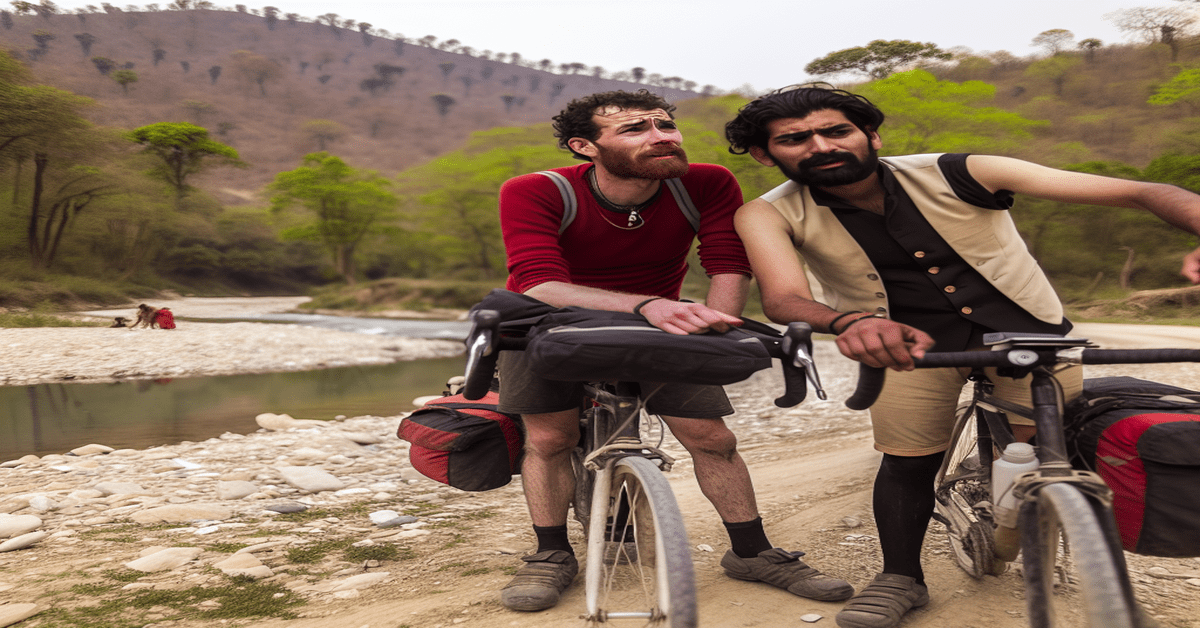The Perils of Blind Trust in Technology: French Cyclists’ Misadventure in India
In a world where we heavily rely on technology to navigate our daily lives, it’s easy to forget that sometimes, our gadgets can lead us astray. This was the hard lesson learned by two French cyclists who embarked on a journey from France to Nepal, only to find themselves in a series of unexpected and challenging situations after following a suggested shortcut from Google Maps.
The Allure of the Shortcut
The cyclists, eager to make good time on their long-distance trek, decided to trust Google Maps when it suggested a shortcut through a remote area in India. Little did they know, this decision would lead them far off the beaten path and into a world of adventure they hadn’t bargained for.
Off-Road and Off-Course
As the cyclists soon discovered, the route Google Maps had chosen for them was far from ideal for their bicycles. Instead of smooth, paved roads, they found themselves navigating rugged, unpaved terrain that put their skills and their equipment to the test. Dense forests, river crossings, and harsh weather conditions became their constant companions as they pushed forward, determined to reach their destination.
Lost in Translation
To make matters worse, the language barrier proved to be a significant challenge for the French cyclists. As they ventured deeper into rural India, they encountered difficulties communicating with locals, making it nearly impossible to ask for directions or assistance. This lack of local knowledge and context only compounded their sense of being lost and disoriented.
The Kindness of Strangers
Despite the hardships they faced, the cyclists were not alone in their journey. Along the way, they encountered local communities who, despite the language barrier, recognized their plight and offered them food and shelter. These acts of kindness served as a reminder that even in the most challenging of circumstances, the human spirit can shine through.
Lessons Learned
The misadventure of these French cyclists serves as a cautionary tale for all of us who rely on technology to navigate unfamiliar territories. While tools like Google Maps can be incredibly useful, they are not infallible. It’s crucial to understand the limitations of these tools and to supplement them with **local knowledge**, **thorough preparation**, and a healthy dose of common sense.
Moreover, this story highlights the importance of being able to adapt to unexpected situations and to rely on the kindness of others when things don’t go as planned. In a world where we are increasingly connected by technology, it’s easy to forget the power of human connection and community.
The Future of Travel and Technology
As we move forward into an increasingly tech-driven future, stories like this one raise important questions about the role of technology in travel. How can we harness the power of tools like Google Maps while still maintaining a sense of adventure and openness to the unknown? How can we balance our reliance on technology with the need for human connection and local knowledge?
These are questions that the travel industry must grapple with as it seeks to innovate and adapt to the changing needs and expectations of travelers. Some possible solutions might include:
1. **Improved context and local information**: Navigation tools could incorporate more detailed and up-to-date information about local conditions, customs, and languages to help travelers make more informed decisions.
2. **Human-centered design**: Travel technology could be designed with a greater emphasis on user experience and the needs of travelers in diverse contexts, rather than a one-size-fits-all approach.
3. **Encouraging community engagement**: Travel companies could prioritize initiatives that foster connection and cultural exchange between travelers and local communities, rather than just focusing on efficiency and convenience.
Conclusion
The story of the French cyclists’ misadventure in India is a powerful reminder of the challenges and rewards of venturing into the unknown. While technology can be a valuable tool in our travels, it is no substitute for human connection, local knowledge, and the ability to adapt to unexpected situations.
As we navigate the future of travel in an increasingly connected world, let us strive to find a balance between the convenience of technology and the transformative power of authentic, immersive experiences. By doing so, we can ensure that the spirit of adventure and discovery continues to thrive, even in a world of Google Maps and instant information.
What are your thoughts on the role of technology in travel? Have you ever found yourself in a situation where over-reliance on technology led you astray? Share your stories and insights in the comments below, and let’s continue this important conversation about the future of travel in a tech-driven world.
#GoogleMapsFaill #TravelTechChallenges #HumanConnectionInTravel
-> Original article and inspiration provided by Zee Media Bureau
-> Connect with one of our AI Strategists today at ReviewAgent.ai


